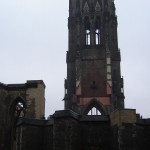 The bell in the crumbling tower struck two, and the sanctuary resounded with the tremor of its solemn cry. It broke through the fervency of Elizabeth’s prayers, and for the barest moment she recalled the dim, damp stone room, full of half-ruined structures and soaring bats. It had once been beautiful. The derelict church bore that sorrowful majesty shared by the remnants of all once-precious things.
The bell in the crumbling tower struck two, and the sanctuary resounded with the tremor of its solemn cry. It broke through the fervency of Elizabeth’s prayers, and for the barest moment she recalled the dim, damp stone room, full of half-ruined structures and soaring bats. It had once been beautiful. The derelict church bore that sorrowful majesty shared by the remnants of all once-precious things.
Elizabeth’s knees ached against the brutal floor stones, but she accepted the pain, using it to accentuate the burden in her soul. Night after night her petitions rose to God. For centuries women had come here to beseech the Creator and to protect the trust and promise given them. Always before three had been chosen to stand before the altar with supplications. Now, only Elizabeth remained.
In her heart and in her prayers she suffered vicarious anguish on behalf of the entire earth. She had spent her life in poverty, crushed by cruel men and hardened women. She had experienced in herself how mankind bickered and fought, how it lied and spilled blood. Justice was a bribe; compassion, a stab in the back. No laws bound mankind; no moral code lifted its souls above the realm of beasts. In her prayers she not only remembered all this but she took upon herself all the boundless injustice of a senseless world.The bell tolled three. A single servant still haunted the isle, an old and withered man, and he kept watch in his own way. When he died, Elizabeth would truly be alone.
As the long night passed, she spread herself out face first upon the ground, like one crucified upon the cold stone, and she groaned out of the depth of her sorrow and need. “Send us a Savior, Almighty One,” she whispered. Rain fell through the broken roof.
She woke at the toll of six. The sun was rising and its rays lit the wet benches of stone and the image upon the altar with a crimson sheen. The figure laid out there in stone seemed almost rosy cheeked. Asking forgiveness for her weakness, she struggled to her feet, moving as stiffly as an ancient woman.
A loud crack shook the church. Thin lines ran swiftly along the figure upon the altar. Elizabeth watched in horror as the altar fell to pieces, torn asunder by some unknown force, and even the walls trembled beneath the fearful hand of judgment.
When the dust cleared, a man strong and handsome lay upon the rubble. He sat up slowly, like a man waking in a strange place. His gaze, proud and mirthful, lighted upon Elizabeth. She lowered herself onto a bench, unable to keep her knees from folding.
“My dear lady,” said the man, “can you explain to me what has happened? How have I come to be here?”
With lips trembling in ecstasy, she answered: “You are Arthur Pendragon, come again in our time of greatest need.”